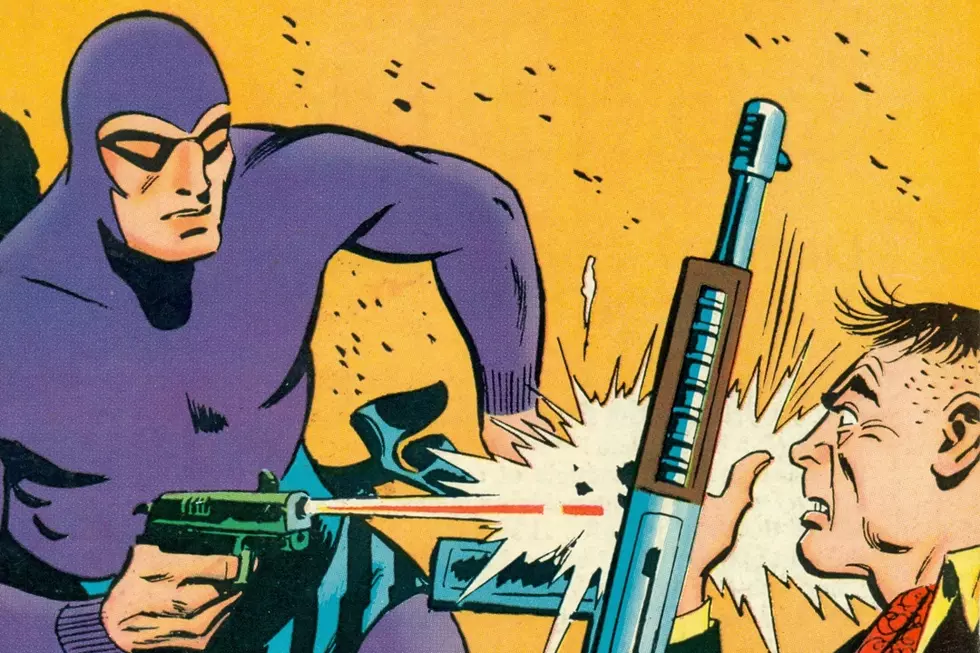
The Ghost Who Walks: An Anniversary Celebration of The Phantom
Cartoonist Lee Falk debuted costumed hero The Phantom in his own newspaper strip on this day in 1936, two full years before Superman debuted in Action Comics #1. He isn't considered the first superhero, but Falk's pulp creation would establish quite a few tropes that would become hallmarks of the genre for decades to come. And like Superman, The Phantom has endured, with comic stories and re-imaginings continuing to this day.
Fresh off creating Mandrake the Magician two years earlier, King Features Syndicate approached Falk (born Leon Harrison Gross) and asked him to develop a new strip. Falk initially tried to sell them on a King Arthur feature, but when that fell through, he offered up The Phantom. Falk considered naming the character The Gray Ghost because of other characters with Phantom in the name, notably The Phantom Detective.
Fascinated by characters who lived double lives, Falk initially planned for The Phantom to be rich playboy named Jimmy Wells by day and a masked crimefighter by night. According to a biography of Falk on DeepWoods, Falk changed gears in the middle of the first story:
I never came out and actually revealed that the playboy was really The Phantom and in the midst of the first story, I suddenly got the other idea. I moved The Phantom into the jungle and decided to keep him there. Gradually the whole concept of The Phantom developed; the generations behind him, the Skull Cave, his wolf Devil and horse Hero and the Bandar pygmies.
Falk was a fan of Rudyard Kipling's The Jungle Book and Edgar Rice Burroughs' Tarzan, and modeled The Phantom and his jungle home partially after those protagonists. Unfortunately, those traits made the Phantom a sort of "white savior" character steeped in colonialist trappings, which made the character more difficult to adapt over the years. Though he was friendly with a group of pygmies, many of his enemies were Asian pirates and other stereotypical characters.
Though he continued to work with various artists (including Carmine Infantino) on The Phantom comic strip until his death in 1999, Falk felt comics weren't a guaranteed living, and branched out into writing plays. Though he managed to get a Mandrake musical produced, a Phantom play never made it to the stage.
In addition to residing in a cave, something many superheroes would also do, The Phantom also wears skin-tight spandex, an idea Falk said he got from Robin Hood. He was also the first hero to be drawn with all-white eyes under his mask. For that, Falk said he took his cue from the inhuman looks of Greek statues (which initially had irises and pupils painted on, but they faded over time).
Arguably the biggest superhero-like trait that The Phantom had was that he was a legacy character. The "current" version of the character --- who is unnamed in the comic strip, but is named Kit Walker in many adaptations --- is the 21st in a line of Phantoms that dates back to the 16th Century.
So why isn't The Phantom considered a superhero? There are a few technicalities. For one, he debuted in comic strips instead of comic books. Second, he has a jungle base of operations instead of residing in a city. Third, he uses guns. However, Falk made it clear that The Phantom shouldn't use his guns to harm his enemies. Instead, he generally uses them to disarm or distract. (Also, he had no superpowers, but that's certainly true of many superheroes.)
The Phantom has been anything but absent from comics over the past eight decades. He's bounced between numerous publishers, including Marvel, DC, Harvey, Gold Key, Charlton and Moonstone Books. Recently he was part of the pulp-character crossover Kings Watch from Dynamite, and over the past few years Hermes Press has published a Phantom series written by Peter David and with art by Sal Velluto.
There's a good chance that if he had been created just a few years later, we'd be calling The Phantom a superhero. Even so, he's a pulp character who influenced lots of superheroes to come. And his comic strip continues today. Not so bad for a hero who isn't in the club.
More From ComicsAlliance







![Jeff Parker On Reuniting The Phantom, Flash Gordon And Mandrake For ‘Kings Watch’ [Interview]](http://townsquare.media/site/622/files/2013/06/kingswatch01.jpg?w=980&q=75)

